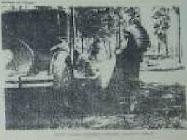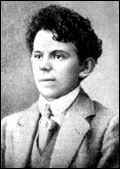A DEFENSE OF (MY) POETRY
Lately I've been in something of a combative mood (in blogland - at Harriet, etc).
I'm in a lonely spot. Non-participating in journals, magazines. Publishing my own books. Indifferent &/or opposed to 1) poetry academia; 2) mainstream poetry; 3) "progressive" poetry networks. Ignored & dismissed by them, in turn. Arguing with other poets on the web.
Yet I've been at it for a long time. Since the 60s, actually. Whereas the web sometimes gives the impression that time & history don't really exist, or count for much.
Poetry in my understanding, is the human (sometimes singing) voice, pushing back against time, violence, emptiness, chaos. The voice of living particularity and experience - the irreducible, the solid quiddity of things, the vivid, the vital truth, the actuality.
Critics, historians & theorists try to recruit poetry for their own ideological and intellectual agendas. I try to think & speak about poetry as a poet.
Not that poetry is necessarily one thing only. But one of my allegiances, I like to believe, is to Joyce's early re-working of Aristotle & Aquinas, where he focuses on the notion of the literary epiphany : when the aesthetic qualities of claritas, consonantia and integritas - brightness, proportion and wholeness - produce a flash of truth or verification about the whatness, the quiddity of things.
This emphasis, from my perspective, must be applied in turn by way of a sense of history as sub specie aeternitatis - ie., the temporal, the historical, as folded within the eternal, the perennial, the everlasting, the infinite.
This is not an easy thing to grasp or assent to in this day & age, I reckon - & it sets me at odds, it seems, with the intellectual zeitgeist.
History, for me, remains informed by salvation history. I am closer to the historical (if not always the social) thinking of Pope Benedict, than to any of the literary theorists or philosophers in the West. The prophetic poetry of Isaiah or Ezekiel regarding the "return from your graves", the return to the promised land, embodies the speech of a people & its strange long destiny - in a poetic way : and makes its ineluctable imprint on the history of the world. & the apocalyptic "play" of the New Testament, the message of the apostle Paul, re-frames this into the cosmic-human drama of the "Son of Man". This is still the uppity, unplaceable human singing voice, piping all the way to Celan.
(Nor would I ever desire to impose my (wavering, unknowing) faith. I am ecumenical. I am a disciple of Roger Williams. Forth of July is as much a "ghost dance" as a Bible remake. But there is that powerful mathematical-philosophical knot, tied by Parmenides way back when... something about "the One". The One as inescapable. & the related question about universality and human nature.)
Let's say the Ancient World ended with the conversion of Constantine. & the Middle Ages ended with the voyage of Columbus. & the Modern age ended in 1945. Then we have the intermission of the "post". But what, really, will be the "new" age?
If we think of medieval & modern as somewhat Hegelian, & mutually dialectical, divagations from the ancient, then perhaps the "new" age will be some kind of return to "the Same" - to the Ancient. (I'm thinking here, in terms of poetry, of both Hart Crane's Atlantis, and Mandelstam's Acmeism - "domestic hellenism".)
& now I'm thinking about how my own interest in the historical particularities, the quiddities, in the poetics of Joyce, Pound, WC Williams, Olson - has led me in various ways to re-frame that same impulse into the para-Biblical "chronicle" of In RI, the airy-windy transcend-a-national epic, Forth of July. & all the other poems, short & long... making a kind of rocky quiddity out of "Henry" & "Providence".
My little bit of wild-mustardy granular iconoclasm is very itchingly, gratingly inconvenient for hikers in the big hiking boots of Americana Poetry Industry, I know, I know.
skip to main |
skip to sidebar

Henry Thunder Winnebago

Osip Mandelstam

Elena Shvarts
Henry Gould's poetry & poetics. Write me : henryhgould@gmail.com

Henry Thunder Winnebago
Blog Archive
-
▼
2008
(300)
-
▼
March
(35)
- Fontegaia Space Odyssey.7 A still-bare delta of br...
- Where is this Fontegaia, the poem, a-goin'? Who ...
- 6 It must have been a time like this,in the beginn...
- Fontegaia zeroes in.5 Saturday afternoon. A lambe...
- I start working on these things during breaks at w...
- C'mon down & meet Anny & me.
- The segment of Fontegaia posted yesterday (#3) - s...
- Fontegaia. To be continued...2 I was lonely in th...
- - there, got that off my chest, said the egomaniac...
- Feel like I'm in between things... an early spring...
- Reading: a history of Ethiopia; Pope Benedict's s...
- & so begins part 4 of Fontegaia. 10 yrs after Stu...
- On Good Friday 10 years ago, I finished the first ...
- The latest version of Rest Note, which includes th...
- Conclusion of Fontegaia, part 3.28 It seems a squa...
- Fontegaia, winding up...27 Lakewater used to lap t...
- This last section of Fontegaia chapt. 3 (#26, belo...
- Some more Font-mumble.26 There was a voice whisper...
- 25 We abide beside you, swept the mournful pines;w...
- Roll on, Fonty...23 That dusklight through a south...
- Reading fantastic book : Antipodes of the Mind, by...
- Have to try to pull myself together & write a real...
- Fontegaia chapt. 3 heads homeward now.22 It was su...
- In the course of ridin' along with Fontegaia poem,...
- Fontegaia on my mind...20 It has to be this morsel...
- A DEFENSE OF (MY) POETRYLately I've been in someth...
- A Fontegaia Saturday.19 A gray March-rainy day in ...
- 18 Up in the quiet municipal chamberover the burle...
- 17 We want the sound of equilibrium.We want the ru...
- A response to my friend Kent Johnson over in the c...
- Andiamo, Fontegaia...16 Steadfast in the furnace t...
- SELF-INTERVIEWA few days ago, on the Poetry Founda...
- Fontegaia has inched along to a certain perihelio-...
- Last weekend I happened to be in New York, & went ...
- Fontegaia in the woods...11 I would be opening myw...
-
▼
March
(35)
About Me
HG Links

Osip Mandelstam
Elena Shvarts

No comments:
Post a Comment